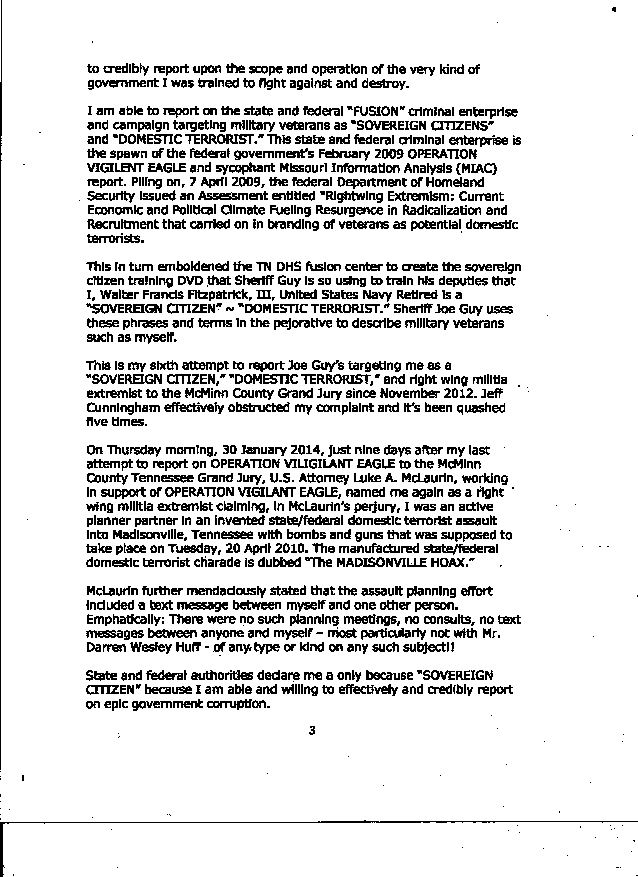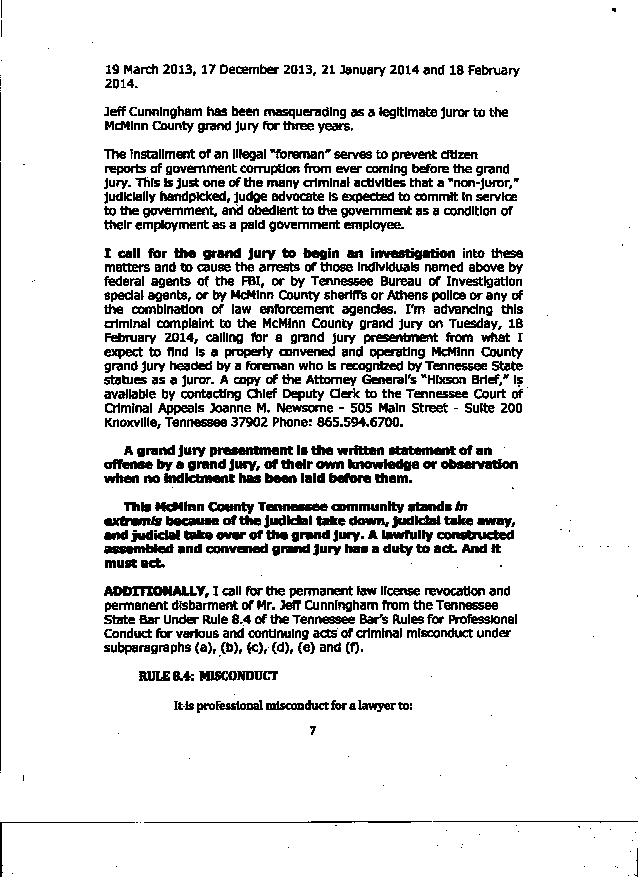JURORS REFUSE TO COMMENT ABOUT ALLEGATION OF BRIBERY, COERCION
by Sharon Rondeau

(Aug. 26, 2014) — On June 24, CDR Walter Francis Fitzpatrick, III (Ret.) was convicted of “aggravated perjury” and “extortion” as a result of bringing petitions to the McMinn County grand jury which claimed that former grand jury foreman Jeffrey Cunningham, criminal court judges, prosecutors and court clerks had violated various Tennessee laws.
Fitzpatrick was arrested on March 18 after waiting for more than four hours to receive notice on whether or not his petition would be reviewed and his testimony were needed.
A more-than-two-year period was identified for Fitzpatrick’s alleged crimes in the indictments issued minutes before Fitzpatrick’s arrest, but the state failed to produce a detailed Bill of Particulars. While Cunningham was named as the accuser, he later withdrew that claim in sworn testimony.
For decades, judges throughout Tennessee have been permitted to appoint their own unvetted grand jury foremen who serve for months, years, or decades at the pleasure of the judge and inevitably influence the members of the grand jury allegedly chosen by “automated means,” as the law requires.
TCA 22-2-314 states that no juror may serve a consecutive term anywhere in the state.
Former McMinn County grand jury foreman Jeffrey Cunningham is CEO & President of the Athens Federal Community Bank and was serving his third consecutive term earlier this year, resigning in early March. Cunningham testified that he was chosen by former Judge Amy Reedy to be her “next grand jury foreman” by means of a telephone call placed to his home during an evening in late 2011.
Last fall, Tennessee Attorney General Robert E. Cooper, Jr.’s office issued a brief in which it described the grand jury foreman’s role as “ministerial and administrative,” therefore justifying his appointment, or hiring, by the criminal court judge as a long-term employee, not a juror. However, the foreman reportedly casts his vote with the other 12 empaneled members of the grand jury, thereby combining the state’s interest with that of the grand jury, whose role is to act independently of government influence.
Judge Jon Kerry Blackwood, who presided over the trial, had previously stated in court that the grand jury foreman is “no different from any other member of the grand jury.” However, Blackwood has himself signed numerous appointing orders for grand jury foremen over more than three decades which lack the previously-utilized wording affirming that the appointed foreman “possess[ed] the qualifications of a juror under the laws of this State before entering upon the duties of his office…”
In addition to TCA 22-2-314, Rule 6(g)(2) of the Tennessee Rules of Criminal Procedure states that the grand jury foreman “must possess all of the qualifications of a juror.”
A local media story from early 2011 which had quoted Monroe County Chief Court Clerk Martha M. Cook as having said that the grand jury foreman is selected by the judge “from wherever they choose” was removed approximately two weeks ago after having been quoted frequently by The Post & Email in its reportage of judicial corruption within Tennessee’s Tenth Judicial District.

Blackwood did not allow a subpoena for Cook’s appearance at Fitzpatrick’s pre-trial hearing to be served.
TCA 40-12-105 states that “Any person having knowledge or proof that an offense has been committed may apply to testify before the grand jury subject to the provisions of Tennessee Code Annotated…”
During both the pre-trial hearing on June 16 and the trial on June 23 and 24, Cunningham denied having formally accused Fitzpatrick of anything or that any information stated in Fitzpatrick’s various petitions was untrue.
A recording of the proceedings on June 24, beginning at approximately 40:00, begins with Carter stating that Fitzpatrick’s petitions to the grand jury were intended to “harass Jeff Cunningham…to get his way…” and to “take his [Cunningham’s] law license.” Carter said that Fitzpatrick “picked on” Cunningham by bringing the petitions which claimed that Cunningham had committed crimes. DS400017
In arguing the case for “harassment,” Carter called Fitzpatrick’s claims against Cunningham a “terrorist threat” (47:58) because “Mr. Cunningham resigned from the grand jury,” although the jury exonerated Fitzpatrick of that allegation.
“You only have to find one false statement,” Carter said of Fitzpatrick’s petitions, claiming that his petition statements and request for a restraining order against Cunningham were “a lie.”
Carter claimed to the jury that Fitzpatrick had “threatened to take” Cunningham’s law license, although the petitions did not state that, and later, Fitzpatrick’s attorney, Van Irion, told the court that Fitzpatrick would not have had the ability to rescind Cunningham’s law license in any event.
The question of why a licensed attorney was serving as grand jury foreman was not addressed.
Carter called Fitzpatrick’s request for a restraining order “an ex parte proceeding” that would have excluded Cunningham, a necessary party. However, a hearing in late June on a restraining order requested by Marvin William Young in Monroe County had both parties there, with the other represented by an attorney, a benefit Young has been unconstitutionally denied by Judge Carroll Lee Ross.
Carter claimed that Cunningham’s testimony “in front of you yesterday…pointed out all the false statements,” although Cunningham had denied that Fitzpatrick had made any false statements in his petitions.
At 55:00, Carter stated that Cunningham was prevented from “lawfully serving” as the grand jury foreman by Fitzpatrick.
Irion told the jury that Fitzpatrick’s petitions had asked for “redress of grievances,” which is a “constitutionally-protected” activity. At 58:39, Irion stated that if petitions to the government for redress of grievances are “made a crime,” then that First Amendment right is taken away from all Americans. “That cannot stand…that should be enough, all by itself,” Irion stated, for the jury to acquit on all charges.
Irion told the jury that the prosecution would have to prove that Fitzpatrick had intended to deceive. “There’s no evidence of that,” Irion contended. “The prosecution must prove each element…beyond a reasonable doubt.” “It’s not illegal to file a petition with the government,” Irion said.
Regarding the charge of “extortion,” Irion told the jury that “coercion requires a threat” which he claimed was absent in Fitzpatrick’s petitions (01:19).
Irion warned the jury that if they voted to convict, “the right to talk to people…about matters of public importance…protected under the Constitution of the United States,” would be lost.
At the beginning of his closing arguments, Carter stated that “the Constitution does not protect your right to lie” and make false statements.
In an email following the jury’s verdicts, Fitzpatrick wrote:
I never committed any act of extortion against Jeffrey Lane Cunningham.
EVER!
Cunningham testified a number of times under oath that I never threatened Cunningham.
Cunningham testified that Cunningham felt no threat from me (in his 16 June 2014 testimony as I recall.)
I attempted to advance legitimate and now proven accusations against Cunningham.
In his sworn statements Cunningham confirmed that I acted legally in petitioning the Grand Jury.
Cunningham, working with Ross and Reedy, furiously and successfully obstructed me from testifying on Cunningham’s obstructions.
There is no proof of extortion…
And yet…
and
Finding me guilty of “aggravated perjury” was impossible.
Nothing I wrote in any of my formal petitions was false.
Jeffrey Lane Cunningham admitted, under oath, that my written statements were true.
In his sworn testimony Cunningham confirmed the truth of my written statements. Cunningham gave proof that my complaints were true. Complaints that Cunningham, working with Ross and Reedy, worked furiously to keep me from testifying to the Grand Jury about.
There is no proof of perjury.
And yet…
Another observation Fitzpatrick made on June 17, the day after the pre-trial hearing, reads:
An observer to the sentencing proceedings on August 19 described the judicial corruption on display “deep and obvious” but eliciting a tepid response from the American people.
Last week, it was suggested that members of the grand jury and trial jury were “bribed” or otherwise pressured to vote to convict Fitzpatrick. As of Monday evening, The Post & Email recontacted three of the trial jurors, one of whom is the Athens, TN building inspector, Gene McConkey, to ask if, in his opinion, anything untoward occurred by means of intimidation, bribery, coercion or undue influence in the jurors’ decisions. We reached the wife of juror David Lange in person and left our contact information, then left a voice message for Roy Grimes.
None has responded as of this writing.
On the list of jurors obtained from the McMinn County clerk’s office, McConkey is noted as “Eugene” but is referred to by the City of Athens as “Gene McConkey.”
As of Tuesday morning at 10:01 a.m. EDT, Fitzpatrick remains in the McMinn County jail despite McMinn County Sheriff’s Department Corporal Ruebush having told The Post & Email yesterday, “He’s going to prison, ma’am.”
A video is currently in production of Fitzpatrick’s efforts to expose grand jury and judicial corruption in Tennessee’s Tenth Judicial District by William F. Fain in conjunction with The Post & Email and Abel Danger’s Lt. Col. Field McConnell, USMC (Ret.).












A DNC sham to hide the crimes committed by Obama and his criminal assistants who are lining their pockets each day while destroying America. “Oceans 11” is under way.